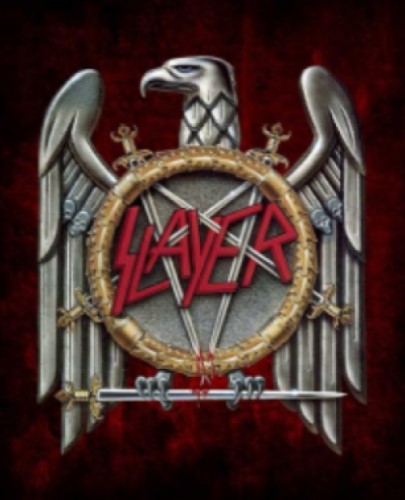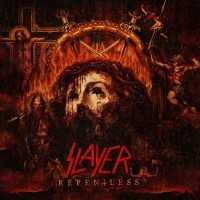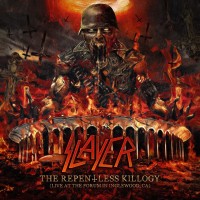Getting Into: Slayer: Part 2

| Written by: | omne metallum |
| Published: | April 19, 2021 |

Already legends a decade into their career, Slayer were riding high as the 90's took hold. Although trends would come and go, Slayer put their heads down and horns up, and carried on marching to their own beat for the following three decades before calling it a day in 2019. Although these years may not be as critically acclaimed as those covered in Part 1, the band would continue to offer something exciting moving forward and would go on to become the band that every metalhead and would-be heavy music fan would listen to.
The band's run of high-quality releases reaches its end with the release of Divine Intervention; while still a fun and enjoyable album, there is clear light between it and what came before (and after) it in terms of quality, both the stronger and weaker releases. While it is a step down from what came before, don't think that the album is a write-off; it has its share of issues, but there is still plenty here to keep you listening again and again.
Perhaps the most eye-catching part of this album was that it signalled the end of the classic line-up (for now at least), with the second departure of Lombardo from behind the drum kit; while an integral part of the band, I can't help but say that the band chose his replacement well, with ex-Forbidden stickman Paul Bostaph being a solid replacement. As if to head fans off, the album kicks off with "Killing Fields", which is almost a showcase for Bostaph to endear himself to fans with its mix of eclectic drum patterns and straight-up fast-paced drumming.
The album does have some solid tracks within its runtime, "Dittohead" perhaps being the best known and for good reason; although the classic run of albums may be over, it does not mean that Slayer are no longer capable of throwing a few gems out there. The haunting "213" and "Fictional Reality" are the other tracks I would point to as the best from this record, although "Circle Of Beliefs" and the aforementioned "Killing Fields" are not too far behind them.
The main issues with Divine Intervention lie in its production and what is overall a mixed batch of tracks: too few killer cuts and too many ok songs to really push it to the next level. The production is too compressed and sterile, meaning the songs don't fly off the handle like they are built to and you are left with a clear division between the listener and songs. Additionally, tracks like "Sex. Murder. Art." and "Serenity In Murder" aren't terrible, but they lack that spark to give them anything beyond passable quality.
While I'm a fan of both thrash and hardcore, Undisputed Attitude is a case of the wrong songs for the wrong band. Slayer are so wide of the mark that it just falls flat on its face; while on paper thrash and hardcore have a lot of overlap (conveniently named crossover and thrashcore), Slayer connect the wrong dots and end up combining all the elements that don't work together, leaving you with this mess.
Slayer draw their power from playing tight and hitting hard, whist these songs revel in raw unrefined power; tracks like "Verbal Abuse/Leeches" just see the two combine to cancel each other out. While there is no doubting the aggression of either, they are born out of different circumstances, with most hardcore being born of anger and drawing its energy from primal and raw power. "Mr. Freeze" for example just sounds like a really, really half-arsed Slayer song rather than a cover, and "I Wanna Be Your Dog" is bent all out of shape.
While putting your own spin on a cover rather than merely copying it is a good idea generally, on Undisputed Attitude it just doesn't work, and thus it feels like a collection of well-produced demos rather than a genuine finished article. I don't knock the band for trying, nor do I feel like they are betraying anyone or anything by wanting to do this, but I would be lying if I said it's a match made in heaven (or hell in the band's case).
While the two tracks of Hannemann's pre-Slayer Pap Smear are a fun novelty, neither is particularly great or offers much beyond that. Some see "Gemini" as a diamond in the rough (being the only original track here); I don't think it's anything special either, certainly not strong enough to carry the dead weight of the rest of the album.
Probably the one album that is unnecessary listening.
Speaking of two things that shouldn't be combined, Slayer decided to play the 90's at its own game and decided to hitch a ride on the fast-rising nu metal tide. All those who say the band were stale and repeating themselves never account for the time period between 1996 and 2001, with Diabolus In Musica being the biggest example. By deciding to dilute their trademark sound down with some nu metal, the band did show a level of diversity beyond what was expected; its addition is as welcome as piss in a swimming pool.
Upping the use of effects and simpler downtuned riffs that try to bridge two distinct sounds that have little in common, Slayer attempted an unholy alliance (no, not that one) that had little business mixing together. While the atonal guitar parts are somewhat reduced, they are replaced with riffs that would fit on a Coal Chamber record. Don't believe me? Swap the atonal solo with some Loco and "Stain Of Mind" wouldn't be out of place there.
There is little to be found on the album save for a few scattered ideas here and there that seem half-formed and a song in "Scrum" that would be one of the weakest tracks on many of their other records. Bostaph continues to impress on drums even when given a poor hand in terms of material to work with; he's trying on tracks like "Desire" and "Screaming At The Sky", but there is only so much he can do. Still, no one else comes close to coming out of this unscathed.
Given the trainwreck nature surrounding this album, the only real reason to listen to it is out of morbid curiosity; you are extremely unlikely to find something beyond head-scratching disbelief as reason to return to this once you've heard it.
While ostensibly moving away from nu metal, God Hates It All doesn't fully extricate itself from the genre, and there are moments and tracks that have a few holdovers left in the mix, although thankfully the band decide to dial down the influences in favour of returning to a more thrash-orientated album as of old.
Where the album succeeds is that it sees the band regain their composure and produce some of their strongest material since the 80's, alongside other tracks that are solid. The best known among these tracks is "Disciple", which rightly ranks amongst the band's best work as it is an instant classic. "Payback", "New Faith" and "War Zone" are not on the same level but will still kick you in the ass and add to the number of songs on here that will give you something to listen to beyond the second track.
This high-quality material comes with a trade-off, however, with the low points being at a Diabolus In Musica level. From the dreary "Seven Faces" and "Deviance" to "Cast Down", some of the material here is offputting. Alongside tracks that are middle of the road like "Bloodline", you find yourself with an album that is very unbalanced in quality.
What holds God Hates Us All back is the same issue with many thrash bands come the turn of the millennium; in their desire to return to their roots, they sometimes produce a very generic and uninspired type of thrash that is dull and not a patch on their earlier work, with "Exile" springing to mind here. Ironically, it is the nu metal influences that give some of these tracks an impetus and life beyond behind stale facsimiles, with "Here Comes The Pain" and "Threshold" featuring interesting cadences (it's not rapping) in its verses and offering up something fresh for the listener; alas, in both cases this is wasted in tracks that are otherwise poor. It is at least a step in the right direction and a welcome about-turn from what had otherwise been a low point from the band.
It was with Christ Illusion that creative inertia truly took hold of the band; although Slayer hadn't tinkered too much with the formula prior to this (the biggest deviation in Diablous In Musica being their biggest flop), there was some level of experimentation that kept the band sounding fresh. Upon the release of Christ Illusion, it became clear that, aside from a handful of tracks that had a quality that elevated them above reproach, the formula was set and each subsequent release would be a gamble of whether the good tracks outweighed the bad, rather than expecting anything new creatively.
It is lucky for listeners, then, that Christ Illusion manages to produce the band's most consistent work in years, with the album as a whole being high in quality and containing some gems added on top, from the Grammy-winning (I kid you not) "Eyes Of The Insane", the opening one-two of "Flesh Storm" and "Catalyst", and the overlooked "Consfearacy". While they weren't the most original tracks in the band's expanding back catalogue, they overcome this issue by compensating with enjoyment value.
The return of Lombardo was a welcome one; although Bostaph was a more than capable replacement, the Lombardo style was far more fitting for Slayer and adds to songs like "Cult", which bounces out the speakers thanks to the tight double bass work. The only song that doesn't belong is "Catatonic", which is eminently skippable, although the issue is compounded by being followed by "Black Serenade", a track that smacks of the creative inertia mentioned earlier.
It was alas that World Painted Blood was to be the last album with the classic line-up, as Jeff Hanneman would pass away four years later and Lombardo left the band for the final time before the follow-up. It is then a shame that this configuration of the band would finish on such a low note, a record that screams autopilot and offers little in the way of the band as a going concern.
The production is a huge hindrance here; while I appreciate that the band might have aimed for a stripped-back approach, it is done in such a way here that it sucks so much of the power out of the tracks, leaving them limp and struggling to assert themselves. It is a huge shame, as it prevents the songs from becoming better than the form they take on World Painted Blood, with the likes of "Hate Worldwide", which threatens to fly off the handle but lacks the power to back up the song, and "Playing With Dolls", which lacks the brooding atmosphere that the music tries its best to produce but is unable to conjure up, suffering most heavily. "Unit 731" has an annoying and prominent snare drum that will draw your attention away from the rest of the track, leaving you feeling like you're listening to three minutes of snare with some rather plain guitars to the side of it.
Add to this a collection of tracks that are facsimiles of their prior output in "Beauty Through Order", "Americon" and "Human Strain" and you have an album that plays out with little in the way of anything ear-catching. The only real moments that offer much in the way of genuine excitement are the opening title track and "Hate Worldwide", while "Psychopathy Red" and "Public Display Of Dismemberment" are passable, though I wouldn't put them on a greatest hits record by the band. It would come as little surprise when it was revealed that this record was written at the last minute and in a hurry, sounding like every trope was thrown in a blender with World Painted Blood the resultant mess.
There is many a Slayer fan that decries Repentless for carrying on after the loss of Hanneman and departure of Lombardo; I am of a similar sentiment, but mainly because it meant that the worst tendencies of the band were now unfettered. This album is just autopilot the whole way, and there is little in the way of anything fresh or unique.
While the band were never the most verbose lyrically beforehand, here it sounds as if the band are ranting loudly about abstract ideas rather than at least pretending to give a crap; long gone is the faux satanism of Hell Awaits and in comes "a little violence is the ultimate drug, let's get high" from "Vices"? ugh. Add this to a collection of tracks that feature generic and unmemorable instrumental compositions ("Pride In Prejudice", "Chasing Death"), and you have an album that blurs into one, except for when the quality manages to drop below the low bar set early on.
Musically, it is the new blood that prove to be the highlights, with the returning Bostaph ensuring that again the drums are not the weak point and Exodus' Holt injecting much-needed variation into his solos, to the point that you can easily tell which solos he wrote versus those of King on tracks like "You Against You".
Is there fun to be had here? Yes, but it's like ordering a small fries instead of a large fries; you will find yourself wanting more than what is on offer and you can't go back for more. Aside from "When The Stillness Comes", no track in particular stands out above the rest, as they settle into the same malaise that only halfheartedly gets your head moving, and the aforementioned track only rises above it due to its change of approach, which while a welcome change of pace, isn't good enough to live up to the hope it briefly offers.
Culled from the band's farewell tour, The Repentless Killogy (Live At The Forum In Inglewood, CA) is the final page in the book of what was a historic career for Slayer; although it is uncertain as to whether the band will return in some form in future, they at least sign off in style.
While far from perfect, from track selection disagreements to questionable performances from those involved, the album has a raw charm and live feel that compensates for this by immersing you in the moment and giving you an experience that is so often lacking in live records. Sure, Araya sounds raw as hell and so breathless that he can barely push the words out of his mouth, but I'll take that instead of an overdubbed faux live album; it's as authentic as you will get unless you were lucky enough to have seen the band live yourself.
This authenticity does come with a few strings attached; you will notice some tracks in which the instruments blur into a whirlwind of incoherent noise (the guitars in "Hallowed Point" being a prominent example), while some tracks have a tendency to sound bloated, like "Postmortem" and "Angel Of Death", but unless you are a stickler for a sterile sound it is still worth the trade-off.
Given a lot of the material is present on Decade Of Aggresion, it would be easy to contrast between the two, but you have to remember the former album culled tracks from a selection of shows, whereas this album is from only two shows, leaving it an unfair comparison before the caveat of age is even brought into the equation.
Worth it for the experience.
=========================
Not the most consistent career when viewed in full, but when Slayer did it right they were untouchable; though the band had their mis-steps, there was plenty of gold to be found and plenty to enjoy. There is a reason why the band inspired such devotion and became such a household name; though they may (possibly) not be a going concern anymore, I look forward to the day when I am woken up whilst hungover in a festival field again by the drunken roar of SLAAAAAAAYYEEEEEERRRR.
 | Written on 19.04.2021 by Just because I don't care doesn't mean I'm not listening. |
Comments
Comments: 14
Visited by: 118 users
| BitterCOld The Ancient One Admin |
| Nejde |
| nikarg Staff |
| JoHn Doe |
| musclassia Staff |
| Bad English Tage Westerlund |
| sgtrobo |
| nikarg Staff |
| sgtrobo |
| LordFezzington Lost To Apathy |
| Deadsoulman Elite |
| Redel Moderator |
| Stormm |
| Alakazam spendin' cheese |
Hits total: 2612 | This month: 19















